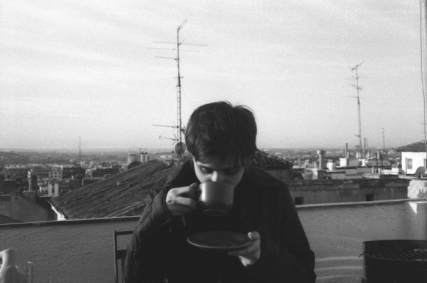When
Penelope goes to a party,
The men
remember.
They do not
expect to see her there
And are
shaken out of their slumber.
They are
now grown used to seeing
the women
freed from feeling
Women who
are only echoes.
They
remember without truly remembering,
Odysseus
does not recognize her for he never got back to Ithaca.
Ithaca is
no more, now is only a vast mainland,
And
Penelope the orphan,
The
wanderer among men.
She carries
her knitting and weaves and unweaves it obsessively.
She has no
stories to tell.
She carries
with her the spider womb and that’s what wakes them,
Odysseus
remembers being tied to the mast.
Penelope
would not forget even if she ate the lotus-flower,
And she is
immune to the voice of the sirens.
She brings
this with her as a heavy but soft truth on all of them.
The other
women are stirred and grow defensive.
They don’t
know what it is, for they don’t see the charm in her:
Penelope
looks haunted by shadows and whispers,
She’s not
quite there.
She speaks
with no gift for interaction,
She can
only interrupt.
Her words
are lullabies, they soothe with their musical strangeness,
But none do
sleep from them: they are awaken to their own words.
They don’t
really think much of talking,
They speak
like they fuck and like they hunt: to expel from themselves a weapon.
"How can we
deny the self when all of language is exploring its existence?
How can we
ask "why" without a separate self?
Penelope must
ask herself in silence.
How can we
learn to not fool others if we do not study
the ways
that we fool our selves?"
Postmodernism,
please don't kill the self,
She begs.
You kill
all the opiums, all meaning.
Penelope
does not understand violence because everything is touch to her:
The contact
of two eyes the basic and most meaningful.
She
searches with her eyes around the room,
Hoping but
no longer expecting to be caressed.
From her
exudes a hum that all do fear but can’t resist, the hum of memory,
The hum of
time suspended,
And all
approach but turn away at her twitchiness,
Her nervous
thirsty body.
She may not
remember how to love,
And really
it is tragic.
Only in the
trance of music
Penelope sets
her compulsive knitting down.
In one
great exhalation of movement, she swoons somehow:
Two bodies
are close together and the light that exudes them seduces.
After all,
he is a man
And she is
a woman.
They will
go to a quiet place and he, pleased at her soft features,
Will kiss
her without much thought,
But she
will in passionate anxiety emit through her body a tremor of urgences:
We must
look in the mirror and succumb to a waterfall of forgiveness,
we must
cleanse and treasure our selves to be true,
and be a
different color of the rainbow in the different types of light,
which is
not, in fact, as blank as being black.
“If we stop
relying on theory,
If you don’t
forget you and me
And that
you and me is not a temporary thing...
(I am not
dead if I have only gone away,
You men do
not know how to wait)
and return
to being, quietly and thoughtfully,
it will
happen without us even trying to understand...
And that's
when we'll go back to childhood,
to the
fantastic exploration and admiration of the Other,
the true
God who is not Ourselves, in heaven!”
That is her
climax,
In her heart of mind,
She is not
interested in half-shared climaxes:
No climax beyond
the warm cocoon of a body around her.
She’ll
still love with the strangely dignified love of woman
That
knowingly loves what is unworthy of her.
That way,
she lives in the world of shame,
But is free from the world of guilt.
Heaven, the
end,
is just a
promise to the return of Paradise,
the
beginning,
only
supreme in that the sunset is more “meaningful” than dawn,
Or so they
say.
Penelope
sighs.
Guilt is a
rush to earn that future paradise,
and shame
is the bitter but secret knowledge
that we could just have stayed with the dawn.
"We could
have stayed in Ithaca..."










